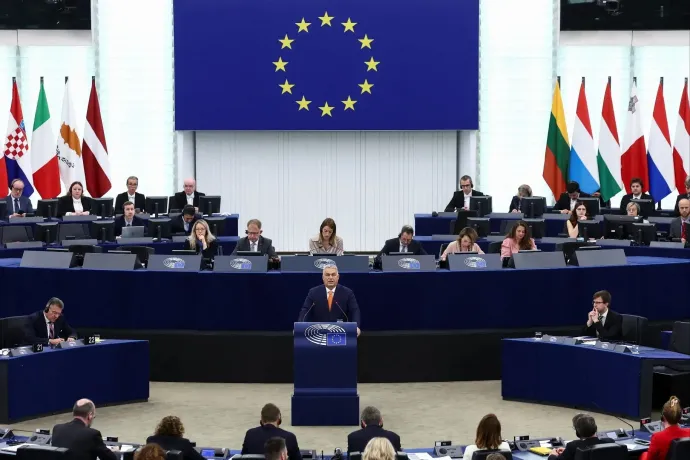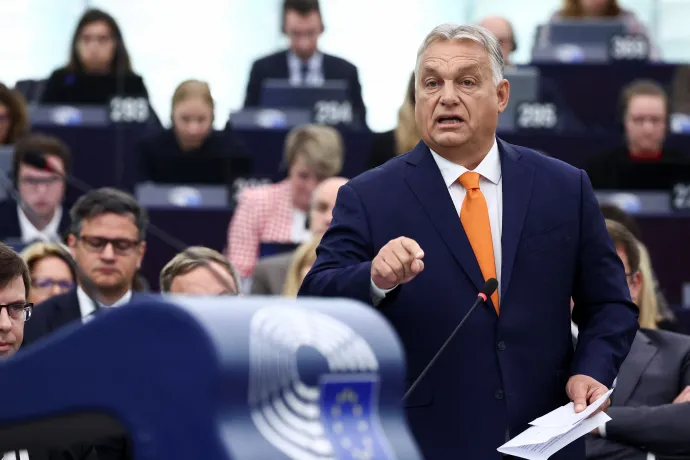"I am here to sound a wake-up call" – Orbán at the European Parliament

"I am here to sound a wake-up call (...) The European Union must change, and that's what I would like to convince you of", Hungarian Prime Minister Viktor Orbán said, beginning his speech at the European Parliament’s plenary session. He then pointed out that this was his second time speaking as the leader of the country holding the Council Presidency and that he was aware it was a "great honour" to be heard.
Looking back at Hungary's Council Presidency in 2011, Orbán said that Hungary was facing crises at that time too – including the Arab Spring, the financial crisis and the aftermath of Fukushima.
"We promised a stronger Europe back then and we delivered on our promises."
– Orbán said, praising the previous Hungarian presidency. "The last time the EU successfully completed an accession process – Croatia's accession – was during our first presidency," he added.
Turning to the present time, he said that the EU is in a much more serious situation now than it was in 2011, or at any time in the past, due to the conflicts and the migration crisis in the world. The Schengen Area could fall apart due to illegal migration, and Europe is losing competitiveness, the Prime Minister said, citing the words of Emmanuel Macron and Mario Draghi.
Orbán said that the EU is facing decisions that will determine its own destiny.
He then listed the achievements of the Hungarian Presidency so far. Legislative work is in full swing, he said. As an honest intermediary, the Hungarian Presidency is seeking to cooperate with member states while at the same time defending the EU's fundamental values. But the presidency is not just about administration, he continued.
The voice of change and a catalyst
"The Hungarian Presidency wants to be the voice of change and a catalyst for change", Orbán said, explaining that he believes that the European Presidency also includes political responsibility. Among the problems, he first mentioned the issue of competitiveness, noting that "over the past two decades, the EU's growth has been persistently slower than that of the United States and China".
Orbán said that electricity is expensive, but so is gas: he said that the departure from Russian gas had led to a significant loss of GDP, and pointed out that energy prices had made investors less enthusiastic.
“Let's not delude ourselves into thinking that the green transition alone will solve the problem.”
– Viktor Orbán said in relation to the EU's objectives on going green. Orbán said that according to predictions, the number of people using fossil fuels will not be significantly reduced by 2030 and that the obstacle to the green transition is that the EU is "applying climate policy without an industrial policy".
European companies spend less on research and development than their US competitors, especially when it comes to digital technologies. Migration will not compensate for the negative demographic trends. The situation is serious and requires immediate action, we are in the 24th hour, Orbán said.
Member states are expecting swift and decisive action from the EU institutions, such as reducing over-regulation, strengthening the internal market, green industrial policy, ensuring affordable energy prices and a policy of connectivity. There are also successes, such as the growth of the battery industry, Orbán said. The objective of the Hungarian presidency is to adopt a new competitiveness pact.
The solution to migration
Orbán said the second problem facing the EU is the so-called migration pressure. In this context, Orbán said that "the external borders of the EU must be protected. Protecting the external borders is in the interest of the entire Union, and the EU should provide substantial support for that," Orbán said, followed by some applause.
In his opinion, Hungary has been engaged in serious political debates on migration since 2015. Commenting on the EU's proposals on migration, Orbán said: "I've seen a lot of things that were greeted with high hopes, but they all ended in failure," The reason for this failure, according to him, is that there are no external hotspots.
“Once we let someone in, we will never be able to send them home, regardless of whether they have the right to stay or not.”

– Orbán said, for which he also received a round of applause. The Hungarian Prime Minister said that the only solution is to only allow people to enter the EU with a permit.
"Illegal migration has led to a rise in anti-Semitism, violence against women and homophobia in Europe."
– Orbán then said, repeating this sentence twice, which was also met with applause from the right, but booing from the left.
Schengen summits, a solution to the problems facing the Schengen Area
"Is it possible to rebuild the real will to make the Schengen area work?" – Orbán then asked, summing up what Hungary is looking for during its rotating presidency.
Although he drew the umpteenth round of applause on the far right when he spoke of Schengen, he was greeted by a solitary but louder round of applause on the left when he called for the extension of the area without internal border controls to include Bulgaria and Romania. This time, his statement was met with silence from the right, perhaps not coincidentally: the two countries' inclusion is most opposed by Austria, where the Austrian Freedom Party (FPÖ), which is in the same parliamentary group as Fidesz, recently won the elections.
We should start holding Schengen summits, because the Schengen area is in crisis, Orbán proposed, arguing that similar summits have solved the EU's problems before. He suggested that Romania and Bulgaria should become full members of the Schengen area before the end of the year.
The EU is currently not able to guarantee its own security, which is why the Hungarian Presidency is proposing a strengthening of the defense industry. Hungary is also spending a lot on defense, much of it on development, often from EU funds.
Stabilizing the Balkans
Without Serbia's EU membership, the Balkans cannot be stabilized, Orbán said.
He then noted that the EU had made a promise to the Balkan countries 20 years ago to provide them with a European perspective, and that "the Hungarian Presidency believes it is time to deliver on that promise".
The Prime Minister also spoke about the EU's agriculture, in which they would like to show political direction in the interests of a competitive, value-retaining and farmer-friendly agriculture.
"Cohesion policy is not about charity and it is not about handouts," Orbán said, turning to the issue of regional disparities. He believes that the key is to achieve convergence within the EU.
From the right side of the chamber, where Fidesz's group, Patriots for Europe is seated, the Prime Minister was applauded repeatedly for his statements on migration and going green, among others, but most of all for his closing words: "Let's make Europe great again!".
For more quick, accurate and impartial news from and about Hungary, subscribe to the Telex English newsletter!